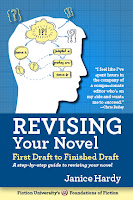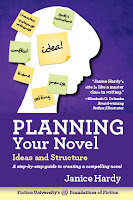Last week, a reader emailed me a question about fictionalizing real life events and people. It’s a topic I don’t think I’ve actually discussed here before, and one worth diving into, as writers pull from the real world all the time. But there is a difference between inspiration from a writer’s life, and basing a novel on real events.
Great events and people tend to inspire stories. We can’t help but imagine the inner workings of a situation, the twists of a potential plot, and the reactions of the people involved. It’s only natural for us to want to take that spark and develop a story around it.
But fiction is not journalism. Fictionalizing real events isn’t the same as writing an article about what happened during that event. Trying to adhere too much to the truth can lead you into trouble.
Real Doesn’t Mean Better
One common problem with fictionalizing real life events is that you can get too caught up on being accurate and forget that it's still FICTION. The goal is the same as any other novel—to write a compelling story and entertain your readers. When basing a plot on real events, it’s easy to say, “Well, this is how it really happened,” even if that truth makes a boring story. It can even hold back your creativity if you see a fantastic way to create obstacles or raise the stakes, but since it didn’t happen that way, you disregard it to be true to the event.
Let the real life event inspire you, but don’t be afraid to adjust it as you need to for your novel. Do what serves the story. You aren't writing a biography, you're telling a tale inspired by this event. If your instincts say change something, but you hesitate because that’s not what really happened, stop and ask what the best thing for the story is. It's probably whatever new idea just inspired you.
Treat the Real Life Event Like Research
It can help to treat the real life events like background research, same as any other story you might develop. Genre writers pull from real life all the time, using the basics of a place or situation and molding it to fit their worlds and plots. It might be a well-known event, but the story you’re telling set during that event doesn’t follow a real person who experienced that event.
How old the event is also plays a role. Historical events will naturally feel more like background research than current events and won’t need as much fictionalizing. With a recent event, it can help to look at the event conceptually and plot from there. For example, if you want to write about a mass shooting, perhaps create a fake shooting inspired by the one you feel compelled to write about. Let the real event help you craft the fictionalized one.
Be true to the emotions surrounding the event, but let how those emotions unfold and the people who experienced them do it differently than how it really happened.
Use Your Own Characters
If the event is all that’s inspiring you, then just using the event and creating your own characters makes fictionalizing real life events much easier. You'll be less inclined to adhered to the truth with fictional characters with their own agendas and goals. There are plenty of novels set in World War II, but they tell the tale through fictional characters.
Fictional characters in real events also makes it easier to craft fictional goals and problems set in that event. You won’t be letting a real person’s actions guide your plotting decisions.
Treat the Event and the People Who Lived Through it with Respect
Writing about real events is a little different from writing about real people, but be cautious when fictionalizing the people in real life events. Be respectful of those involved, especially if the event is traumatic or sensitive. Be honest and true to your story, but also remember you’re writing fiction, not an exposé.
From a legal standpoint, make sure you fully research the ramifications of using real people in your fiction before you proceed. For example, turning a known figure into a villain might make for a great story, but you could be slandering that person or creating legal trouble for yourself.
(Here’s more on writing from real life)
In the End, Be a Storyteller
No matter where your inspiration comes from, tell a great story. The more you focus on a solid plot, compelling characters, high stakes, unexpected twists, and all the pieces that go into a strong novel, the more likely your inspiration will fictionalize itself. The event will guide you, but not force you to follow the history of it, because your characters and their stories will turn that event into something new.
Have you ever fictionalized a real life event?
 Looking for tips on revising your novel? Check out my book Revising Your Novel: First Draft to Finished Draft, a series of self-guided workshops that help you revise your manuscript into a finished novel. Still working on your idea? Then try my just-released Planning Your Novel Workbook.
Looking for tips on revising your novel? Check out my book Revising Your Novel: First Draft to Finished Draft, a series of self-guided workshops that help you revise your manuscript into a finished novel. Still working on your idea? Then try my just-released Planning Your Novel Workbook.  A long-time fantasy reader, Janice Hardy always wondered about the darker side of healing. For her fantasy trilogy The Healing Wars, she tapped into her own dark side to create a world where healing was dangerous, and those with the best intentions often made the worst choices. Her novels include The Shifter, Blue Fire, and Darkfall from Balzer+Bray/Harper Collins. The Shifter, was chosen for the 2014 list of "Ten Books All Young Georgians Should Read" from the Georgia Center for the Book. It was also shortlisted for the Waterstones Children's Book Prize, and The Truman Award in 2011.
A long-time fantasy reader, Janice Hardy always wondered about the darker side of healing. For her fantasy trilogy The Healing Wars, she tapped into her own dark side to create a world where healing was dangerous, and those with the best intentions often made the worst choices. Her novels include The Shifter, Blue Fire, and Darkfall from Balzer+Bray/Harper Collins. The Shifter, was chosen for the 2014 list of "Ten Books All Young Georgians Should Read" from the Georgia Center for the Book. It was also shortlisted for the Waterstones Children's Book Prize, and The Truman Award in 2011.  Janice is also the founder of Fiction University, a site dedicated to helping writers improve their craft. Her popular Foundations of Fiction series includes Planning Your Novel: Ideas and Structure, a self-guided workshop for planning or revising a novel, the companion Planning Your Novel Workbook, Revising Your Novel: First Draft to Finished Draft, and the upcoming Understanding Show Don't Tell (And Really Getting It).
Janice is also the founder of Fiction University, a site dedicated to helping writers improve their craft. Her popular Foundations of Fiction series includes Planning Your Novel: Ideas and Structure, a self-guided workshop for planning or revising a novel, the companion Planning Your Novel Workbook, Revising Your Novel: First Draft to Finished Draft, and the upcoming Understanding Show Don't Tell (And Really Getting It). Website | Facebook | Twitter | Goodreads | Amazon | Barnes & Noble | iTunes | Indie Bound


I wrote a paranormal love story of two children destined to marry who were separated on board the Titanic. My story was inspired by a pair of children's shoes displayed in the Titanic exhibit of the Halifax Maritime Museum in Nova Scotia.
ReplyDeleteNaturally, there's a lot of historical information to adhere to. My story was about the boy who died, told from his point of view after following the girl who lived as her invisible childhood friend.
The image of the shoes stuck in my mind until a story formed about the child they belonged to.
What a great inspiration. Something so small can spark a whole novel :)
DeleteI'm currently combining my decade of RV travel into a story that I was inspired to write after reading about a military sex-slave trade that was busted.
ReplyDeleteThat's an interesting combination. But a great example of how writers pull stories from all kinds of places.
DeleteA good story is kinda like a good bottle of wine; it gets better with age, even though the chemical content is significantly altered.
ReplyDeleteIn other words, a story has a natural tendency to change or be altered over time. This is not necessarily a bad thing, especially if the this change can be nurtured and cultured.
Very true.
DeleteI think all of the above is true. But stories based on real life can do wonders, if well written. Especially if it wasn't funny at the time but is now. I've written a story around a major incident that happened with our family. When my sister got to the incident, she recognized it right away. But she was surprised, because the characters & everything that lead up to it or was affected by it, gave her no clue. Not only that, sometimes a sentence or paragraph from a similar story fitted into mine perfectly. Just in a different context. Gale
ReplyDeleteSounds like you did a great job fictionalizing it.
DeleteIn my novel Troll-magic, my protag awakens suddenly in the middle of the night to discover a complete stranger climbing into her bed.
ReplyDeleteThat exact same thing happened to me when I was in my early twenties. I drew heavily on my own experience while writing that scene!
Yikes! That sounds terrifying.
DeleteIt was terrifying, although I came through it okay. It turned out to be weird, rather than violent.
ReplyDeleteIf you are interested: http://jmney-grimm.com/2013/12/visitors-surprise/